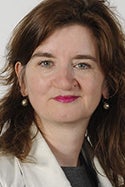Interview with Marieke Schuurmans
Interview with Marieke Schuurmans
The practical science of care
"Body and mind are far from separated."

On the other side of fundamental brain research –lab-rats, genetics, neuronavigation techniques and the like– resides nursing science. This is prof. Marieke Schuurmans' territory, which is embedded in almost every nook and cranny of all other medical research fields.
Nursing may be just as old and established as doctoring, but as a scientific field of expertise, it's relatively young. In 1988, Schuurmans was the 100th student to gain a master in Nursing Science. She became a nurse after that and was appointed professor (the third in Utrecht) in 2010. “In 2001, my PhD study was only the second dissertation ever written in the Netherlands about delirium. Amazing, since it's such a widespread phenomenon. I developed an observation instrument to recognize delirium and act on it. This instrument is now common use in hospitals and in nurse-education in many western countries. Just recently I've received a translation request from China. Yes, I enjoy seeing our research results becoming common sense in daily care.”
Nursing journals uitklapper, klik om te openen
“In general, your worth as a researcher is weighed by the number of publications in key journals. For us, our works' worth lies also in the exposure of our knowledge in teaching books, in nursing journals. I teach at the bachelor of Nursing program of the University of Applied Science Utrecht) and I'm professor to about 150 part-time master-students in Nursing Science at the University Utrecht.”
Cross knowledge is necessary not only for medicine, for Schuurmans personally as well; there are only three professorial chairs for nursing science in the Netherlands. “In Sweden I would have had 79 colleagues – I do have some lobbying to do! I've recently applied for funding to educate our most talented postdocs towards professorship. Nurses form the largest workforce in care and our agenda is huge, so it's very important that we firmly remain academically embedded.”
Within the Brain Center, Schuurmans sees plenty of opportunities for translational research. “I'm setting up projects with rehabilitation and with neurology, and within the sport- and physiotherapy-department.”
Getting old uitklapper, klik om te openen
What medics should also take to heart, is the intertwining of body- and brain diseases; it bothers her that so many physicians still keep making distinctions. “It might well be that delirium and depression are entries in the DSM, but they are more often than not the result of physical ailments, varying from stroke, from infection, from undernourishment... From both my nursing expertise as well as my research I know you shouldn't tell body and mind apart.”
Some pressing care questions have risen over the years, most of them as a result of ageing. As people continue to grow further and further into old age, chronic diseases and their psychiatric impact will increase. “Almost all research in my group is about old people. For a long time we've treated them as one big homogeneous group. Which they are not, of course: not one person over 70 responds the same to care –be it of the social or pharmaceutical kind– as her neighbor over 70. Everyone in medicine should take that diversity to heart.”

